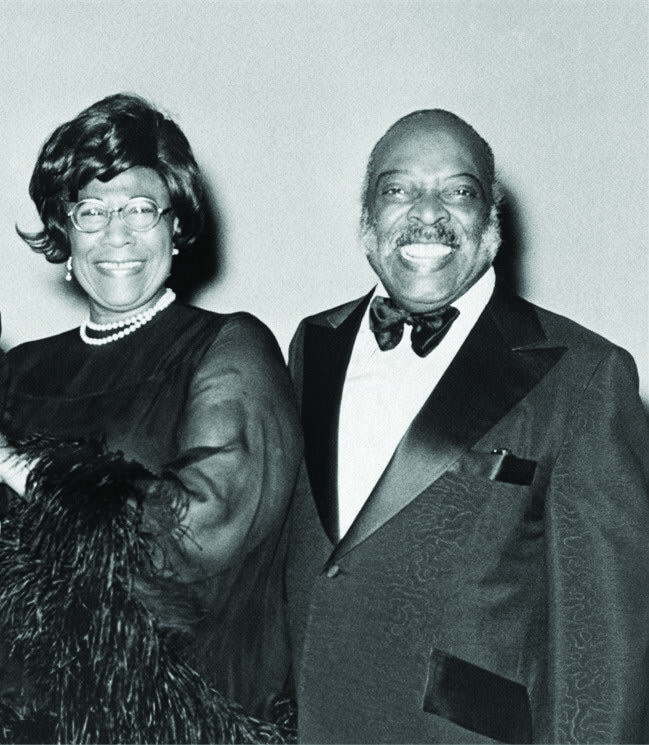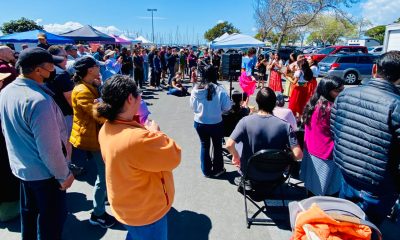Black History
Ella Fitzgerald and Count Basie: First Black Grammy’ Winners
Two Black performers left the event that night with Grammys in hand: Ella Jane Fitzgerald (1917–1996) for Best Vocal Performance, Female, and Best Jazz Performance, Individual; and William James “Count” Basie (1904–1984), for Best Performance by a Dance Band and Best Jazz Performance, Group. Recognition for the pair was well overdue as their roads to the Grammy were storied.

It was the late spring of 1959. The music industry’s elite converged inside the Grand Ballroom of Los Angeles’ Beverly Hilton. Others were gathering at a function held simultaneously in New York City.
That night, the Grammy Award’s first show took place, and no one knew then that it would become a historic event for African-American performers.
Two Black performers left the event that night with Grammys in hand: Ella Jane Fitzgerald (1917–1996) for Best Vocal Performance, Female, and Best Jazz Performance, Individual; and William James “Count” Basie (1904–1984), for Best Performance by a Dance Band and Best Jazz Performance, Group. Recognition for the pair was well overdue as their roads to the Grammy were storied.
Fitzgerald was a teen when her mother died. Her aunt then took young Ella from her home in Yonkers, N.Y., back to Newport News, Va. Shortly after, Ella’s stepfather died. These events brought on depression. Ella began failing school and frequently skipped classes. After getting into trouble with the police, she was sent to a reform school. There she endured beatings by the caretakers. The brutality forced her to escape.
At age 15, she was alone and struggling to make a life for herself. But things would change when she was in New York City about five years later.
In 1934, young Ella performed at the Apollo’s Amateur Night. The crowd booed her; shouted “What’s she going to do?” A frightened Ella decided to sing. She asked the band to play Hoagy Carmichael’s “Judy,” one of her mother’s favorites. Her voice silenced the audience, and by the song’s end they begged for an encore.
Two years later, Ella made her first recording, “Love and Kisses,” under the Decca label. The rest was music history.
Later dubbed “The First Lady of Song,” Ella was the most popular female jazz singer in the United States for more than half a century. On June 15, 1996, she died in her Beverly Hills home. She’d taken home 14 Grammys throughout her career.
Basie, born in Red Bank, N.J., was one of the all-time great jazz band leaders. Dubbed the “King of Swing,” his career started in clubs and speakeasies in Asbury Park and Long Branch, N.J., then New York City (1924) and later Kansas City (1927).
His music served as inspiration for artists including John Lewis, Thelonious Monk, and Oscar Peterson. Along the way, he faced discrimination but overcame barriers to become one of the most influential musicians of the 20th century.
“Every day, we used to say, ‘Not one drop of my self-worth depends on your acceptance of me,’” musician and producer Quincy Jones said of the racism that he and Basie experienced back then. “It was horrible. It ain’t much better now.”
Basie wrote in a letter: “I can’t remember when I did not experience discrimination … And I didn’t let it bug me.”
The Count won nine Grammy awards over the course of his career. He died on April 26, 1984, in Hollywood, Fla.
Activism
Oakland Post: Week of April 24 – 30, 2024
The printed Weekly Edition of the Oakland Post: Week of April 24 – 30, 2024

To enlarge your view of this issue, use the slider, magnifying glass icon or full page icon in the lower right corner of the browser window. ![]()
Activism
Oakland Post: Week of April 17 – 23, 2024
The printed Weekly Edition of the Oakland Post: Week of April 17 – 23, 2024

To enlarge your view of this issue, use the slider, magnifying glass icon or full page icon in the lower right corner of the browser window. ![]()
Black History
Matthew Henson: Explorer Extraordinaire
Matthew Henson, a trailblazing explorer who overcame countless obstacles to leave an incredible mark on history. Born on August 8, 1866, in Charles County, Maryland, his journey is a testament to the power of determination and the spirit of adventure.

By Tamara Shiloh
Matthew Henson, a trailblazing explorer who overcame countless obstacles to leave an incredible mark on history. Born on August 8, 1866, in Charles County, Maryland, his journey is a testament to the power of determination and the spirit of adventure.
Henson’s life began amidst the backdrop of post-Civil War America, where opportunities for African Americans were scarce. From a young age, he possessed an insatiable curiosity about the world beyond his small town. At the age of 12, he embarked on a journey that would change the course of his life forever when he joined a merchant ship as a cabin boy.
His most famous expedition was his journey to the Arctic with renowned explorer Robert E. Peary. In 1887, Henson joined Peary’s crew as a seaman and quickly proved himself to be invaluable with his skills as a navigator and craftsman. Over the course of several expeditions, Matthew endured extreme cold, treacherous terrain, and grueling conditions as he and Peary sought to reach the elusive North Pole.
In 1908–09, Peary set out on his eighth attempt to reach the North Pole. It was a big expedition, with Peary planning to leave supplies along the way. When he and Henson boarded their ship, the Roosevelt, leaving Greenland on August 18, 1909, they were joined by a large group. This included 22 Inuit men, 17 Inuit women, 10 children, 246 dogs, 70 tons of whale meat, blubber from 50 walruses, hunting gear, and tons of coal.
In February, Henson and Peary left their anchored ship at Ellesmere Island’s Cape Sheridan, along with the Inuit men and 130 dogs. They worked together to set up a trail and supplies along the way to the Pole.
Peary picked Henson and four Inuit people to join him in the final push to the Pole. However, before they reached their destination, Peary couldn’t walk anymore and had to ride in a dog sled. He sent Henson ahead to scout the way. In a later interview with a newspaper, Henson recalled being in the lead and realizing they had gone too far. The group turned back, and Henson noticed his footprints helped guide them to their destination. At that location, Henson planted the American flag.
Henson’s legacy extends far beyond his expeditions to the Arctic. He shattered racial barriers in the world of exploration and inspired countless individuals, regardless of race, to dream big and pursue their passions. In 1937, he was finally recognized for his achievements when he was inducted into The Explorers Club, an organization dedicated to promoting scientific exploration and field research.
Matthew Henson died in the Bronx, New York, on March 9, 1955, at the age of 88.
-

 Activism4 weeks ago
Activism4 weeks agoOakland Post: Week of March 27 – April 2, 2024
-

 #NNPA BlackPress4 weeks ago
#NNPA BlackPress4 weeks agoBeloved Actor and Activist Louis Cameron Gossett Jr. Dies at 87
-

 Community2 weeks ago
Community2 weeks agoFinancial Assistance Bill for Descendants of Enslaved Persons to Help Them Purchase, Own, or Maintain a Home
-

 Activism3 weeks ago
Activism3 weeks agoOakland Post: Week of April 3 – 6, 2024
-

 Business2 weeks ago
Business2 weeks agoV.P. Kamala Harris: Americans With Criminal Records Will Soon Be Eligible for SBA Loans
-

 Community2 weeks ago
Community2 weeks agoAG Bonta Says Oakland School Leaders Should Comply with State Laws to Avoid ‘Disparate Harm’ When Closing or Merging Schools
-

 Activism2 weeks ago
Activism2 weeks agoOakland Post: Week of April 10 – 16, 2024
-

 Community1 week ago
Community1 week agoOakland WNBA Player to be Inducted Into Hall of Fame























































